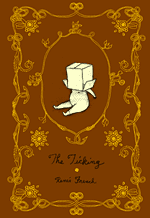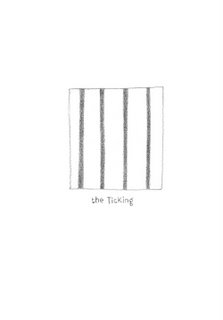The Ticking.
There’s this really great scene in the remake of The Fugitive, where we’re introduced to Tommy Lee Jones’ big cheese U.S. Marshall character for the first time. He gets out of his car and walks quietly up to the scene of Harrison Ford’s latest escape. The officer in charge on the scene is frantic, running around and barking at people and letting everyone, including Tommy Lee Jones, know that he is someone very important indeed.
“Just wait just a second,” he snaps when Jones approaches him to introduce himself.
Jones blinks briefly, then in as mild a tone as possible, says with amusement, “Okay,” and backs up until the officer finally calms himself down long enough to realize exactly who he’s been so rude to.
Tommy Lee Jones doesn’t have to scream and yell to let people know he's the best in his profession. He’s that good.
I realize this subject has been touched on before, but a lot of people don’t get into comics for the same reason that they're put off by the barking man. Often, the writers create characters that, if it was fanfic written by girls about Buffy, would be called “Mary Sues,” the writer’s larger-than-life, more perfect than perfect alter ego that all the other characters are super-impressed with. Shocked. Awed. Invariably there’s a pneumatic, limpid-eyed female to coo about how gosh, she thinks the hero is wunnnderful. The protestations are so great, the yelling and screaming and chest-beating so over the top, that the story and artwork are totally overwhelmed by the strident cries of attention from the author's penis.
Renee French, then, is the comic world’s Tommy Lee Jones.
I'd thought, when I first started getting offers from publishing houses to review their books, that it would curb the urge to buy my own. It hasn't. Not at all. All it did was make my "To Buy" list longer, because for better or for worse, the books you get sent are not necessarily books you'd buy on your own. Due to the positive buzz The Ticking has been getting, though, it was right at the top of my "To Buy" list. So when my editor at the Lincoln Heights Literary Society offered me The Ticking for review, I leaped at it. From the very first page, it was worth it.
The story tells of the life of Edison Steelhead, a little boy born with grotesque facial deformities that he inherited from his father. I thought Edison and his dad were supposed to resemble lightbulbs, but according to a lengthy interview with the author at Newsarama, it turns out she was going for a more of a fish face. 
I was focusing on the "Edison" part of the name and thought "lightbulb," but evidently I was meant to focus on the "Steelhead" part of the name and think "trout."
Fortunately for me, French says in the same interview that she hopes people will find their own personal meanings to her work, so I feel like I  have her permission to compare him to a lightbulb and infer all sorts of lightbulb subtexts in the book that she didn't actually put in there, and cleverly refer to the story as being "luminous" and "enlightening" and such.
have her permission to compare him to a lightbulb and infer all sorts of lightbulb subtexts in the book that she didn't actually put in there, and cleverly refer to the story as being "luminous" and "enlightening" and such.
There are so many complex family themes running though The Ticking, and so many different ways to interpret those themes that it's difficult to describe the depth of such a deceptively simple-seeming graphic novel. Little Edison, whose mother does not survive his birth, is spirited away by his quiet, gentle father to live in a lighthouse. For reasons unstated, Edison and his luminous trout-face (whee!) are hidden away from the public eye by his father, who perhaps is protecting him from cruelty or is saddened and ashamed by him, or both.  Edison spends his time focusing lovingly on sketching slightly grotesque details of human life: dead flies, locks on public bathroom stalls, bits of pubic hair he found left behind on the toilet, covering the first of French's major themes in the novel of accepting the mundane and the ugly as being perfect the way they are. The second major theme, the strife between parent and child, comes when Edison and his father Calvin reach radically different conclusions about their disfigurement. Edison's approach, to embrace his appearance and accept himself for what he is, doesn't sit well with his father, who went through great lengths to change his appearance and encourages Edison to do the same.
Edison spends his time focusing lovingly on sketching slightly grotesque details of human life: dead flies, locks on public bathroom stalls, bits of pubic hair he found left behind on the toilet, covering the first of French's major themes in the novel of accepting the mundane and the ugly as being perfect the way they are. The second major theme, the strife between parent and child, comes when Edison and his father Calvin reach radically different conclusions about their disfigurement. Edison's approach, to embrace his appearance and accept himself for what he is, doesn't sit well with his father, who went through great lengths to change his appearance and encourages Edison to do the same.
When Calvin realizes the extent of his son's loneliness, his response is to bring home a little sister for him, a chimpanzee in a frilly dress. In his growing relationship with the hirsuite Patrice, Edison discovers parts of him that are Calvin-like, namely, his revulsion at Patrice's hobby of eating disgusting things she finds.
This deeply personal story about familial relationships and parental approval strikes a deep chord. It's a struggle to be happy with who you are and what you do if your own family is not happy with who you are and what you do. French, who claims that her own father would prefer that she illustrate greeting cards for a living, (most likely the polar opposite of the creepy little drawings that seem to pour out from her brain to her hand onto the page) writes about this theme gently, but with such sadness and love that it makes The Ticking an incredibly powerful novel. French opens her story with a series of simple pencil sketches of different patterns, consisting of lines and dots. Looking at the sketches gave me the same feeling I sometimes get when looking at a painting in the Art Institute. I love it, I find it riveting, I spend a lot of time in front of it, staring, but I don't know why. And when French begins delving into the story, telling us about the childhood of Edison Steelhead, one of the recurring characters that pops up in her various works from time to time, she somehow manages to send the same underscoring message that she began with those wallpaper-like patterns she drew: study every illustration carefully. Nothing is extraneous. Everything here has been carefully constructed. Because the dialogue is somewhat sparse, it could be said that you could zip through The Ticking in less than ten minutes. To do that would be throwing away the gift French is giving the reader. French has paid her readers the highest compliment of perfecting every word and every illustration before presenting the finished product. It doesn't scream that it's perfect; it just is. Renee French doesn't have to scream. She's that good.
French opens her story with a series of simple pencil sketches of different patterns, consisting of lines and dots. Looking at the sketches gave me the same feeling I sometimes get when looking at a painting in the Art Institute. I love it, I find it riveting, I spend a lot of time in front of it, staring, but I don't know why. And when French begins delving into the story, telling us about the childhood of Edison Steelhead, one of the recurring characters that pops up in her various works from time to time, she somehow manages to send the same underscoring message that she began with those wallpaper-like patterns she drew: study every illustration carefully. Nothing is extraneous. Everything here has been carefully constructed. Because the dialogue is somewhat sparse, it could be said that you could zip through The Ticking in less than ten minutes. To do that would be throwing away the gift French is giving the reader. French has paid her readers the highest compliment of perfecting every word and every illustration before presenting the finished product. It doesn't scream that it's perfect; it just is. Renee French doesn't have to scream. She's that good.
_______________________
The Ticking
by Renee French
2006 by Top Shelf Productions
Hardcover, 228 pp
ISBN: 1-891830-70-8
Saturday, June 10, 2006
<< Home
